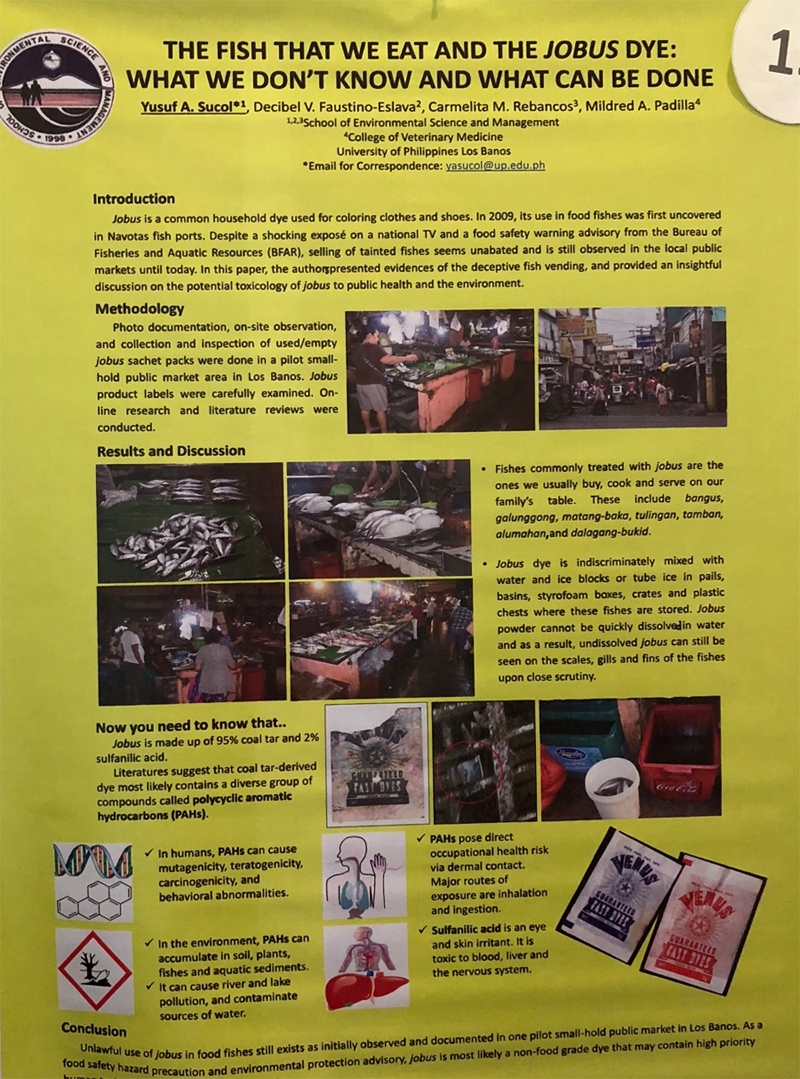
The poster paper entitled “The fish that we eat and the jobus dye: what we don’t know and what can be done” by Dr. Yusof A. Sucol, University Researcher II of the School of Environmental Science and Management (SESAM), won the Best Poster Award for the Social Science Category on the recent UP Society of Research, Extension and Professional Staff, Inc. (UPREPS) 5th Annual Scientific Conference and 9th General Assembly at Shercon Resort and Ecology Park, San Sebastian, Mataas na Kahoy, Batangas last March 21-23, 2018.
With the theme “The Role of REPS in Transforming UP into a World-Class Research Through Science and Innovation”, this year’s conference netted more than 100 REPS from the different colleges and units of UPLB. UPREPS is a SEC-registered organization established in 1986.
The study of Dr. Sucol was based on his dissertation funded by the Department of Science and Technology-Philippine Council for Health Research and Development (DOST-PCHRD) under his PhD in Environmental Science. His poster presented the evidences of deceptive fish vending and provided an insightful discussion on the potential toxicology of jobus to public health and the environment.
Dr. Sucol said fishes commonly treated with jobus are the ones we usually buy, cook and serve on our meals. These includebangus, galunggong, matang-baka, tulingan, tamban, alumahan and dalagang bukid. He added that jobus contains 95% coal tar and 2% sulfanilic acid, and his study suggests that coal tar-derived dye most likely contains polycyclic aromatic hydrocarbons (PAHs). “PAHs may cause mutagenicity, carcinogenicity and behaviorial abnobalities to humans”, said Dr. Sucol. In the environment, PAHs can accumulate in soils, plants, fishes and aquatic sediments, which may cause pollution in rivers and contaminate sources of water, he added.
Other SESAM REPS who presented their papers and posters during the conference were Dr. Loucel E. Cui, University Researcher II, who presented her study entitled “Training Needs Assessment of Farmers in the Philippines”; Cherry S. Padilla, University Research Associate II, presented a paper on “Harmonizing National Environment Laws and Policies with Local Ordinances: the Environment Code”; and Mr. Thaddeus P. Lawas, University Extension Specialist II, who presented a poster paper by entitled “Governance of a Municipality During Disasters: the Case of Sta. Teresita, Cagayan Province”.
In the closing ceremonies, UPLB Chancellor Fernando C. Sanchez, Jr. stressed the importance of the role of REPS in transforming UP into a world-class research university and he encouraged everyone to cultivate linkages with fellow REPS to foster interdisciplinary research. This year’s conference was in collaboration with the UPLB Office of the Chancellor and the Office of the Vice Chancellor for Research and Extension.

